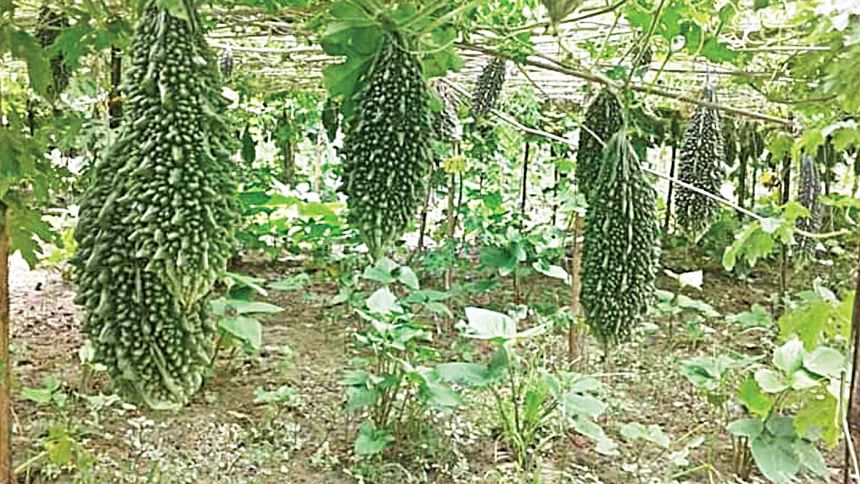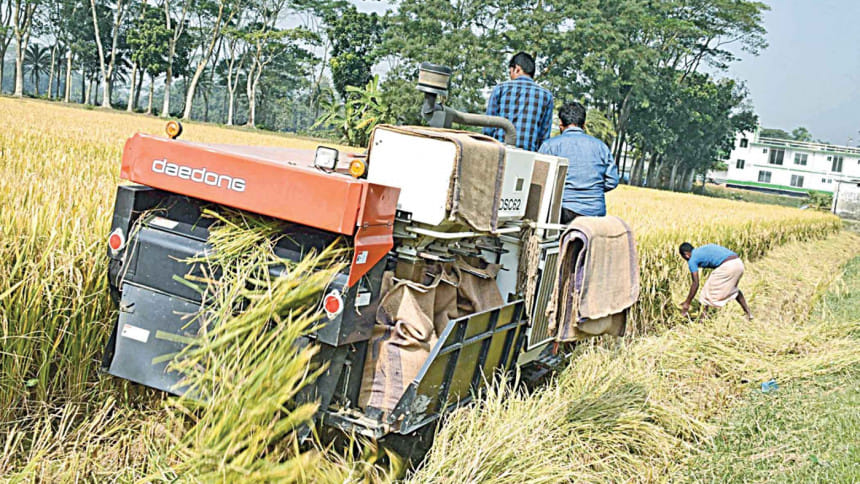The relentless efforts and achievements of our farmers

Covid-19 has repeatedly raised the question of human survival on earth. It also brought to the fore the issues of food production, storage and agricultural skills. But as much as we don't like to get our hopes up, there are many reasons to be hopeful still. Needless to say, agriculture is the sector from which our greatest hope emerges. People have become much more patient even in the midst of anxiety. The government has also played an important role in the farming sector. Over the last eight months, I have presented television reports where I found educated young farmers and entrepreneurs achieve unimaginable success—an astonishing variety of fruit crops being grown, and a major shift in agriculture.
I have always judged the prosperity of the country predominantly through agriculture. When I see a farmer smiling, I believe that the situation in the country hasn't deteriorated much. Again, when I see the farmer plunged into crisis, I think the country seems to be facing a hard time. I also saw some agricultural entrepreneurs play a significant role in taking the country forward. Shahriar Kabir Sajal, a young entrepreneur from Panchagarh, is seeing great financial improvement, worth crores of taka, with his huge biofloc project. Nahid Al Sumon, a young entrepreneur from Mirpur, Kushtia, built a farm with 2,000 ducks during this coronavirus pandemic. Syed Ferdous Murad, a young entrepreneur in Natore, has started a state-of-the-art fish farm in 20 ponds on a 20-acre space. Rafiqul has become famous all over the country by showing the wonderful yield of Baromashi (year-long) mango. Mohammad Solaiman, a retired army officer in Sonagazi, Feni, has shown extraordinary determination to change the face of the country's agricultural economy from a huge 70-acre integrated agro farm. Shahida Begum, an onion seed farmer from Faridpur, who has sold seeds worth Tk 4 crore(USD 473,000) this year, says she wants to continue her hard work to make the country self-sufficient in onions. Chuadanga malta garden entrepreneur Sakhawat Hossain Babul has spread sweet malta gardens all over the country. Kohinoor Kamal, a woman entrepreneur from Chittagong, has ensured supply of healthy fingerlingsamong fish farmers in 12 districts through her hatchery initiative. Ershad Mahmud, another entrepreneur from Chittagong, has set a precedent of remarkable accomplishmentsin raising and expanding the rare Goyal cow breed. His dream is to bring Goyal to an important place in the country's livestock resources. Rakibul Islam Tutul, a young entrepreneur, runs a smart dairy farm of 12 hundred cows in Chittagong's Mirsarai.

Successful entrepreneurs are setting an example of success with great and modern agricultural initiatives. Throwing away the dream of earning money abroad, many young people have returned to the country and built their own agricultural farm. Their one-year earning is equal to 10 years of what they would have earned working abroad. These people are turning the wheel of food security in the country. Agriculture continues to strengthen the foundation of the economy, ensuring the employment of countless people. It really has kept our dreams alive.
The first thing we consider in the place of agricultural economy and policy planning is GDP. The contribution of agriculture to GDP is declining. In the last financial year, the contribution of agriculture to GDP was 13.35 percent. Agriculture is now associated with many sectors including industry and services and is playing a unique role in the economy of Bangladesh.
Considering my four decades of journalistic journey in the development sector (especially the farming sector), it would not be wrong to say that at present, the farming sector is going through one of the most diverse and best times I have personally witnessed. As a result, we are seeing unimaginable abundance in crops. Our success in the production of all food grains, vegetables, fruits, rice, fish, meat, eggs and milk is exemplary. Overcoming many adversities, our farmers have achieved great success in production.
These are the outcomes of free market economy and globalisation. Similarly, there are individual initiatives of the farmer. By cultivating high value fruit crops, farmers are able to achieve commercial success on their own. On the other hand, the multi-faceted activities of the Ministry of Agriculture are being conducted for crop diversification. Above all, the individual initiatives of the farmers are being considered very promising in the field of commercial agriculture.
According to the Food and Agriculture Organization of the United Nations (FAO) Global Food Security and Third Industrial Revolution, is changing everything at a rate never seen before. Most importantly, this change is positively influencing the sectors related to farming. Changes in information technology around the world—through smartphones, the Internet of Things (IoT), the application of artificial intelligence (AI) in equipment management, robotics, biotechnology, quantum computing—have started the Fourth Industrial Revolution.
AI and the IoT are now key parts to the world's latest agricultural machinery. Effective use of modern information technology is being made to facilitate production efficiency and marketing strategy. The biggest success in agricultural mechanisation of Bangladesh has come in land ploughing. In case of ploughing the land,95 percent is done through power tillers. Similarly, 95 percent threshing machines or threshers and 95 percent power pumps are being used for threshing paddy. In other areas of agriculture, mechanisation is slow. 1.5 percent is used in harvest and less than 0.5 percent is used in planting or sowing. However, the use of agricultural machinery has increased day by day. As a result, crop production has increased at a significant rate.
The agricultural machinery manufacturers of our country are continuing their efforts to combine IoT and artificial intelligence with the manufactured machinery. IoT has now started to be used in dairy and livestock farms in the country. We have a promising breakthrough in the fisheries sector. That is the technology of controlling ammonia in fish farming ponds and giving the necessary food to the fish.

In the era of the Fourth Industrial Revolution, there has been a great challenge in the field of agriculture, despite the multifaceted success in increasing productivity and commercialisation of farming goods. The key thing that is missing is the optimal market structure for the farmers. It hasn't been possible yet. That is why despite the increase in crop diversification and production, farmers are still not getting the right price for their produce and the intermediary is still there in different forms. Farmers have no right to fix the price for their agricultural produce and the government hasn't set up a price commission for producers. This is a grave crisis for our farmers. No effective and sustainable initiative has been taken to address this issue yet. Farmers get some price at the beginning of each crop season, but the losses only multiply in later periods of the season. Farmers in some areas can make up for the loss by doing four crops a year. But small and marginal farmers in most areas cannot do that and hence they fail to make much profit to cover up the loss.
We are lagging behind when it comes value addition. As one can see, the market for processed food products in the world is USD 70 billion. Our position in this market is not visible. We export only goods worth USD 500 million. Considering the global market, our export value is a tiny 0.2 percent. We can also look at the calculation of labour force in agriculture. 60-70 percent of our total workforce is involved in the farming sector. Only 2-3 percent are involved in the agro-processing industry. The agro-processing industry is much more labour-intensive. We are lagging behind in production as well as in terms of other agricultural employments. In this case, if our capacity is increased, our exports can turn far better where farmers would also get better prices. We don't see different agricultural goods in the foreign markets. We are not able to enter the big hypermarkets of Europe and USA with our agricultural products. I have been working on this issue for the past 10 years and seen that we lack the infrastructure and effort to move forward for export-oriented agricultural production and export-focused global market. I humbly request the policymakers to focus their attention on this matter.
I must give credit to the government for their diversified efforts which brought success to the sector. But at the same time, I would like to add that there is a need for great effort, considering the dedication of our relentless farmers and agro-entrepreneurs who are fighting every second for agricultural success.
Shykh Seraj is Bangladesh's pioneer development journalist. He received the country's two highest civilian honours, Swadhinata Puroshkar and Ekushey Padak, respectively.

 For all latest news, follow The Daily Star's Google News channel.
For all latest news, follow The Daily Star's Google News channel. 



Comments